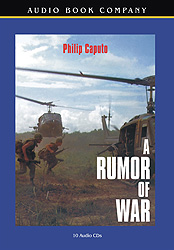
| |||||||||||||||||||
| |||||||||||||||||||

|
A Rumor of Warby Philip CaputoNarrated by Barry Cooper
Description “To call it the best book about Vietnam is to trivialize it . . . A Rumor of War is a dangerous and even subversive book, the first to insist-- and the insistence is all the more powerful because it is implicit-- that the reader ask himself these questions: How would I have acted? To what lengths would I have gone to survive? The sense of self is assaulted, overcome, subverted, leaving the reader to contemplate the deadening possibility that his own moral safety net might have a hole in it. It is a terrifying thought, and "A Rumor of War" is a terrifying book."When it first appeared, A Rumor of War brought home to American readers, with terrifying vividness and honesty, the devastating effects of the Vietnam War on the soldiers who fought there. And while it is a memoir of one young man’s experiences and therefore deeply personal, it is also a book that speaks powerfully about the larger themes of human conscience, good and evil, and the desperate extremes men are forced to confront in any war. A platoon commander in the first combat unit sent to fight in Vietnam, Lieutenant Caputo landed at Danang on March 8, 1965, convinced that American forces would win a quick and decisive victory over the Communists. Sixteen months later and without ceremony, Caputo left Vietnam a shell-shocked veteran whose youthful idealism and faith in the rightness of the war had been utterly shattered. A Rumor of War tells the story of that trajectory and allows us to see and feel the reality of the conflict as the author himself experienced it, from the weeks of tedium hacking through scorching jungles, to the sudden violence of ambushes and firefights, to the unbreakable bonds of friendship forged between soldiers, and finally to a sense of the war as having no purpose other than the fight for survival. The author gives us a precise, tactile view of both the emotional and physical reality of war. When Caputo is reassigned to headquarters as “Officer in Charge of the Dead,” he chronicles the psychological cost of witnessing and recording the human toll of the war. And after his voluntary transfer to the frontlines, Caputo shows us that the major weapons of guerrilla fighting are booby traps and land mines, and that success is measured not in feet but in body counts. Nor does the author shrink from admitting the intoxicating intensity of combat, an experience so compelling that many soldiers felt nostalgic for it years after they’d left Vietnam. Most troubling, Caputo gives us an unflinching view not only of remarkable bravery and heroism but also of the atrocities committed in Vietnam by ordinary men so numbed by fear and desperate to survive that their moral distinctions had collapsed. More than a statement against war, Caputo’s memoir offers readers today a profoundly visceral sense of what war is and, as the author says, of “the things men do in war and the things war does to men.” About the Author After serving in Vietnam, Philip Caputo worked at the Chicago Tribune, where he was part of a Pulitzer Prize-winning team of journalists covering election fraud. He went on to become a correspondent covering the Middle East and the Soviet Union. Caputo also has written five novels and a second volume of memoir. Find Books with Similar Themes Find Books with the Same Narrator  Other Audio Books narrated by Barry Cooper:
Other Audio Books narrated by Barry Cooper: | |||||||||||||||||
|
Copyright ©1996-2022 Audio Book Company All Rights Reserved All materials contained in http://www.audiobookco.com are protected by copyright and trademark laws and may not be used for any purpose whatsoever other than private, non-commercial viewing purposes. Derivative works and other unauthorized copying or use of stills, text or graphics is expressly prohibited. |
